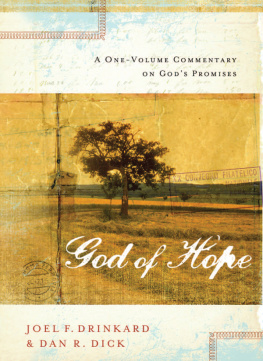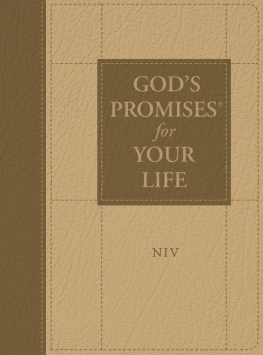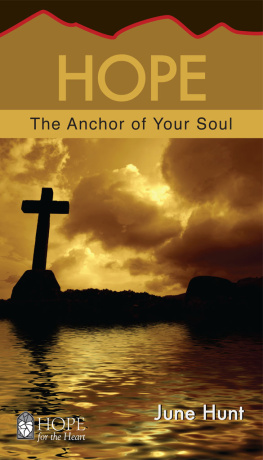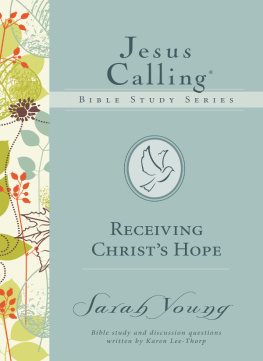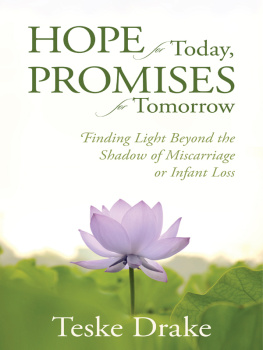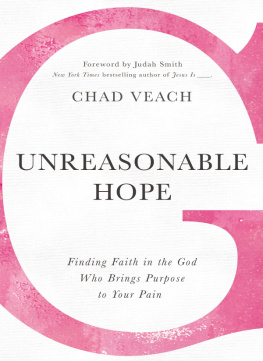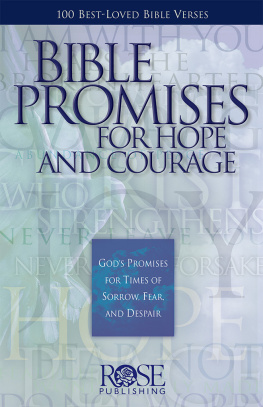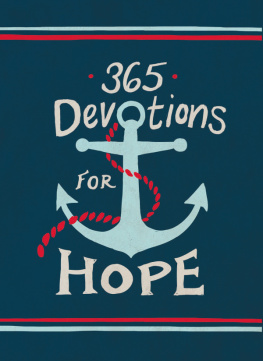
2013 by Thomas Nelson
All rights reserved. No portion of this book may be reproduced, stored in a retrieval system, or transmitted in any form or by any meanselectronic, mechanical, photocopy, recording, scanning, or otherexcept for brief quotations in critical reviews or articles, without the prior written permission of the publisher.
Published in Nashville, Tennessee, by Thomas Nelson. Thomas Nelson is a registered trademark of HarperCollins Christian Publishing, Inc.
Thomas Nelson titles may be purchased in bulk for educational, business, fund-raising, or sales promotional use. For information, please e-mail SpecialMarkets@ThomasNelson.com.
Unless otherwise noted Scripture quotations are taken from the New King James Version. Copyright 1982 by Thomas Nelson. Used by permission. All rights reserved.
All Scripture quotations marked KJV are taken from the King James Version, The Authorized Version.
Scripture quotations marked NCV are taken from the New Century Version. Copyright 2005 by Thomas Nelson. Used by permission. All rights reserved.
Scripture quotations marked RSV are from the REVISED STANDARD VERSION of the Bible 1946, 1952, 1971, 1973 by the Division of Christian Education of the National Council of the Churches of Christ in the U.S.A. Used by permission.
Typesetting: Barbara Dick
ISBN: 978-1-4185-4993-0
Printed in the United States of America
13 14 15 16 17 18 RRD 6 5 4 3 2 1
Contents
A ccording to conventional Christian theology, the Old Testament is a book of law, and the New Testament is a book of grace; the Old Testament is a book of judgment, and the New Testament is a book of mercy or salvation. While there are some generalized truths in those assertions, a fuller picture affirms that both Old and New Testaments include law and grace, judgment and mercy, and deliverance or salvation events. In the Old Testament, law is a part of covenant. Covenant is Gods provision for relationship with humankind and all creation. One specific covenant, the Sinaitic covenant or Mosaic covenant made with the children of Israel, followed their deliverance by God from slavery in Egypt. That deliverance became the primary salvation event of the Old Testament, celebrated by the Israelites from that time forward. The Sinaitic covenant represented the formal agreement between God and the Israelites that marked their relationship. Much of the law or instruction of the Old Testament traces its origin to the Sinaitic covenant. Since the Sinaitic covenant is a direct outcome of the exodus, law (covenant) and grace (deliverance from slavery) are inseparable.
There are relatively few explicit occurrences of the term hope in the Old Testament. Indeed twenty-two of the thirty-nine books of the Old Testament do not include the word hope (compare with the New Testament, in which has the word hope occurs in twenty-four of the twenty-seven books). However, the theme of hope is pervasive throughout the Old Testament.
First, we will consider the type of literature of each book. In the Old Testament, we find law/instruction/regulations: the regulations to guide our relationships with God, fellow humans, and all creation. The regulations cover worship instructions, and what we would describe as civil, criminal, and moral regulations. We also find narrative, sections that primarily relate a story or recount history. We also have prophetic materialthat warns of judgment on disobedience and promises blessing on obediencethat recounts past events, present situations, and future outlooks. And we also have wisdom and poetic material. The Pentateuch (or Law, Torah), especially Exodus through Deuteronomy, provides much of the legal and instructional material. Genesis and Joshua through Esther are primarily narrative. We find most prophetic material in Isaiah through Malachi. And Job through Song of Solomon contain most of the poetic and wisdom material. However, some narrative is found in all major sections, as are prophetic and wisdom and poetic material. Because of the narrative component, the metaphor of a journey seems most appropriate as a central theme for connecting our study of hope in the Old Testament. The first eleven chapters of Genesis describe a journey from creation to the fall, out of Eden, through the Flood to Shinar and Babel. The remainder of the narratives focus on journeys of people: to the promised land; to Egypt; out of Egypt to Sinai; back to the promised land; later into exile in Assyria, Babylon, and Egypt; and ultimately return.
The Biblical Basis of Hope
Throughout the Bible, our hope is centered in God and the acts/grace/mercy/purpose of God. ScriptureOld Testament and New Testamentmakes abundantly clear that we find no real hope in ourselves or in other humans. People, friends, and family can be supportive and helpful to us. To view ourselves, our family, our government, or any other human agency as the ultimate source of hope, however, will bring only disillusionment and loss. (See Ps. 33:1617: No king is saved by his great army. / No warrior escapes by his great strength. / Horses cant bring victory; / they cant save by their strength (NCV). Our ultimate hope rests in God alone. Hope and help go together.
Do not put your trust in princes
or other people, who cannot save you.
When people die, they are buried.
Then all of their plans come to an end.
Happy are those who are helped by the God of Jacob.
Their hope is in the LORD their God.
He made heaven and earth,
the sea and everything in it.
He remains loyal forever. (Ps. 146:36 NCV)
There is a link that connects all of the Bible. This is the connection between Genesis (especially Gen. 12) and Revelation (especially Rev. 2122). What we see in these bookends of the Bible are creation and new creation, paradise created and paradise restored, creation of heaven and earth, and creation of new heaven and new earth. All of the no mores of Revelation 2122 (no more tears, no more mourning, no more pain, no more death) indicate the full and complete restoration of Gods hope, plan, purpose for creation in the new creation. The end of Scripture fulfills the hope of the original creation. The rest of the Bible describes the journey from Gods hope initiated in creation to Gods hope consummated in the new heaven and new eartha journey that began with the first human sin. All of Scripture describes the effortshuman and divineto restore hope. All human efforts (and hope centered in humans or human agencies) ultimately fail. Only Gods intervention when the time was fully come could ultimately restore Gods vision.
We are still on the journey toward the restored hope of Revelation. We live in a fallen world, but one that has hope, genuine hope, that comes not from human efforts but from Gods provision in Christ Jesus.
As we look through the Old Testament for markers of hope, we will look not just back into history of long ago and far away but at a journey we continue to travel today. We will not focus backward, dwelling on what ifs. Instead, we will look for the elements of hope experienced in the Old Testament in the midst of sin and fallenness, and we will see reflections of our own journeys. The hope of the Old Testament focused on the future, as does all hope.
Having examined the connections between the testaments, we need to note that hope in the Old Testament differs significantly from New Testament hope and the hope we have as Christians. Old Testament hope did not have the fulfillment of the crucifixion and resurrection of Jesus Christ. The Old Testament could only hope for Gods redemption of creation. The deliverance of the exodus and covenant grace did not restore creation to Gods vision. The Old Testament picture of God is that of the eternal optimist. Gods plan in creation is one of perfect union with Gods will; so creation as God willed it and as God completed it, was good, very good. In a word, it was perfect. However, God gave to humans freedom and choice, without which we would be mere robots. God the Optimist freely gave humans choice, recognizing they could and would make bad choices. So God established laws to deal with the consequences of those bad choices. All are Gods lawsphysical, moral, or religious. Gravity is a physical law: if you jump off a cliff and try to fly, gravity will inevitably bring you down. In creation, Adam and Eve received only one law: Of every tree of the garden you may freely eat; but of the tree of the knowledge of good and evil you shall not eat (Gen. 2:1617). Adam and Eve broke this law, bringing severe consequences for all humankind. God the Eternal Optimist is also God the Judge. God is also the Redeemer, however, the God of many second chances (the Eternal Optimist). Gods plan is for perfect harmony and perfect relationship between God and all of creation. So God works to redeem all creation. Therein is our hope.
Next page
